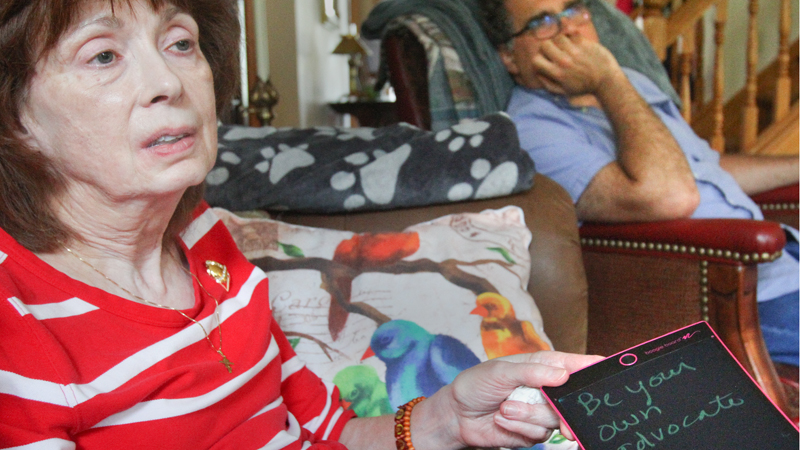Austintown doctor her own best advocate when ALS struck

By Jessica Hardin
jhardin@vindy.com
AUSTINTOWN
More than a year before her diagnosis, Dr. Dinah Fedyna’s tongue began to feel fuzzy.
Soon, she developed problems chewing and swallowing.
Then, she started to slur her words.
On the electronic tablet she now uses to communicate, Dinah described “My fear that came true.”
In July 2018, she was diagnosed with amyotrophic lateral sclerosis, or ALS.
Dr. Fedyna has a type of ALS called “bulbar-onset.” This condition attacks cranial nerves that involve speech, swallowing and breathing.
“It has all the potential to become full-blown Lou Gehrig’s disease,” said her husband, Joe Novicky.
The condition that affects 20 percent of ALS patients is incredibly difficult to diagnose.
“This version of [ALS] is not traceable by actual blood count tests. It’s all process of elimination,” Joe said.
“Nothing is obvious,” Dinah wrote.
DIAGNOSIS DELAYS
Frustrated that they could not see a specialist, Dinah and Joe eventually went to the Cleveland Clinic emergency room. They waited nearly four hours and went home.
It took 15 months of monitoring her own symptoms and visiting various doctors to receive the correct diagnosis.
Considering that Dinah is a doctor about an hour from one of the world’s best hospitals, it’s not an overstatement to say that this situation might be impossible for a layperson to navigate.
Despite their challenges, the doctor who diagnosed Dinah told her that he’d never diagnosed an ALS patient so early in their experience of the disease.
When Christine Terlesky, the Boardman woman diagnosed with ALS six years ago, described how many Americans suffer from ALS, she explained that the figure is inadequate, “because people die so quickly.”
But so far, Dinah has been one of the lucky ones, as her husband Joe described her.
With self-advocacy bolstered by her medical training, she has delayed death.
She found an experimental medication produced in Amsterdam that has slowed the progression of her disease and persuaded her doctor to approve the treatment.
She takes a cocktail of medication that amounts to more than 30 pills each day.
Today, she is mobile. Dinah can exercise and garden. She can drive her 17-year-old daughter Natalia to swim practice.
But she cannot speak.
“There were times when the charades of the trying to communicate was difficult,” Joe said.
MANAGING ALS
They’ve adapted to manage the current stage of the disease.
At the grocery store, Dinah can use her phone to type out a message. She writes what she can’t say on an electronic tablet. The family recently purchased a device that will speak the words she types.
“We have a lot of faith for whatever reason that we have this time we have. It’s not to be wasted and just hope that things go positively,” Joe said.
The time is precious, because the arc of the illness can’t be predicted.
Her doctor told them, “It’s all what the bulbar decides it wants to do.”
The evidence of Dinah’s efforts to cope with the uncertainty of her prognosis are all over her home.
The plant beds lining the path to her front door teem with blooming flowers of every color. In mid-June, she was waiting for the rain to subside so her vegetable garden in the backyard could thrive.
GUIDED BY FAITH
Her living room walls are covered with beautiful orthodox Christian icons depicting religious figures intricately painted on backgrounds of golden foil.
When asked the role of faith in her life, Dinah raised her hands in exclamation and quickly scribbled on her tablet: “It’s been everything.”
The family belongs to Sts. Peter and Paul Ukrainian Orthodox Church in Youngstown.
“It’s helped bring a certain amount of calmness to what could be just a lot of anxiety,” said Joe.
With the church, Dinah still organizes bimonthly community outreach dinners.
Two months after she was diagnosed, she resigned from her positions at NEOMED and Mercy Health.
At NEOMED, she was most recently director of geriatrics and course director for Principles of Clinical Medicine. She was a primary care physician at Mercy Health.
Her friends and colleagues set up a scholarship for NEOMED students studying family medicine in Dinah’s name.
The inaugural Dinah Fedyna Family Medicine Award was presented to Renee Brumbaugh of Warren on June 4. Brumbaugh completed her third year at NEOMED and plans to become a family practitioner in the Valley.
At the award reception, Dinah’s daughter Natalia spoke, thanking her mother for her love and support.
WHAT’S NEXT
Like ALS that begins with weakness in the limbs, the most common cause of death for bulbar-onset ALS is respiratory failure.
The medications Dinah takes have slowed the progression. Her treatment could delay death for months or for decades.
With that impossible truth in mind, they do their best to live day by day.
For now, Dinah and her family have said they’re hopeful. They strive to maintain normalcy for Natalia, who will be a senior at Austintown Fitch.
“In a way, it’s positive. We’re together,” Joe said. “We’re more thankful for that now. We take less for granted.”
They’re together, because they acted quickly.
Joe explained that ALS patients can miss opportunities to prolong life when a diagnosis is delayed.
“If it jumps on you and you’re not ready, it can take someone down quickly,” Joe said.
When asked what advice she would give someone newly diagnosed, Dinah wrote a brief list.
“People know their bodies,” Dinah wrote. “Be your own advocate. Read new things. Question tests. Even great doctors miss things.”
 43
43

